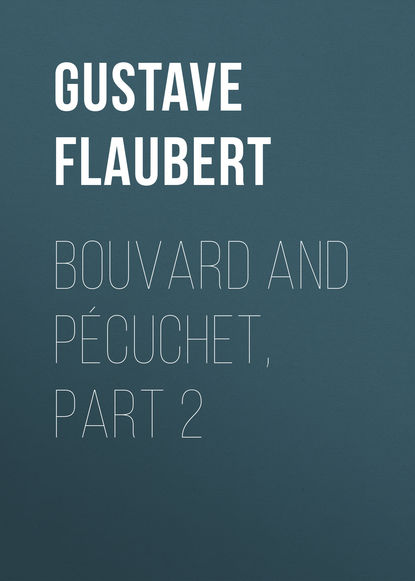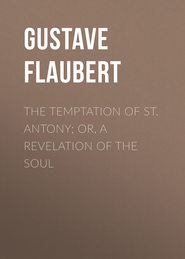По всем вопросам обращайтесь на: info@litportal.ru
(©) 2003-2024.
✖
Bouvard and Pécuchet, part 2
Настройки чтения
Размер шрифта
Высота строк
Поля
“Perhaps there was at the bottom a little yellow colour caused by humidity?”
“Not at all! I repeat it, there was not! The cause of the gilding was the contact with the Eucharist.”
By way of proof she relied on the attestations of bishops.
“It is, they say, like a buckler, a – a palladium over the diocese of Perpignan. Ask Monsieur Jeufroy, then!”
Bouvard could not stand this kind of talk any longer; and, after he had looked over his Louis Hervieu, he took Pécuchet off with them.
The clergyman was finishing his dinner. Reine offered them chairs, and, at a gesture from her master, she went to fetch two little glasses, which she filled with Rosolio.
After this Bouvard explained what had brought him there.
The abbé did not reply candidly.
“Everything is possible to God, and the miracles are a proof of religion.”
“However, there are laws of nature – ”
“That makes no difference to Him. He sets them aside in order to instruct, to correct.”
“How do you know whether He sets them aside?” returned Bouvard. “So long as Nature follows her routine we never bestow a thought on it, but in an extraordinary phenomenon we believe we see the hand of God.”
“It may be there,” replied the ecclesiastic; “and when an occurrence has been certified by witnesses – ”
“The witnesses swallow everything, for there are spurious miracles.”
The priest grew red.
“Undoubtedly; sometimes.”
“How can we distinguish them from the genuine ones? If the genuine ones, given as proofs, have themselves need of proofs, why perform them?”
Reine interposed, and, preaching like her master, said it was necessary to obey.
“Life is a passage, but death is eternal.”
“In short,” suggested Bouvard, guzzling the Rosolio, “the miracles of former times are not better demonstrated than the miracles of to-day; analogous reasonings uphold those of Christians and Pagans.”
The curé flung down his fork on the table.
“Again I tell you those miracles were spurious! There are no miracles outside of the Church.”
“Stop!” said Pécuchet, “that is the same argument you used regarding the martyrs: the doctrine rests on the facts and the facts on the doctrine.”
M. Jeufroy, having swallowed a glass of water, replied:
“Even while denying them you believe in them. The world which twelve fishermen converted – look at that! it seems to me a fine miracle.”
“Not at all!”
Pécuchet gave a different account of the matter: “Monotheism comes from the Hebrews; the Trinity from the Indians; the Logos belongs to Plato, and the Virgin Mother to Asia.”
No matter! M. Jeufroy clung to the supernatural and did not desire that Christianity should have humanly the least reason for its existence, though he saw amongst all peoples foreshadowings or deformations of it. The scoffing impiety of the eighteenth century he would have tolerated, but modern criticism, with its politeness, exasperated him.
“I prefer the atheist who blasphemes to the sceptic who cavils.”
Then he looked at them with an air of bravado, as if to dismiss them.
Pécuchet returned home in a melancholy frame of mind. He had hoped for a reconciliation between faith and reason.
Bouvard made him read this passage from Louis Hervieu:
“In order to know the abyss which separates them, oppose their axioms.
“Reason says to you: ‘The whole comprehends the part,’ and faith replies to you: ‘By substantiation, Jesus, while communicating with the apostles, had His body in His hand and His head in His mouth.’
“Reason says to you: ‘No one is responsible for the crime of another,’ and faith replies to you: ‘By original sin.’
“Reason says to you: ‘Three make three,’ and faith declares that ‘Three make one.’ ”
They no longer associated with the abbé.
It was the period of the war with Italy. The respectable people were trembling for the Pope. They were thundering against Victor Emmanuel. Madame de Noares went so far as to wish for his death. Bouvard and Pécuchet alone protested timidly.
When the door of the drawing-room flew open in front of them and they looked at themselves in the lofty mirrors, as they passed, whilst through the windows they caught a glimpse of the walks where glared above the grass the red waistcoat of a man-servant, they felt a sensation of delight; and the luxuriousness of their surroundings rendered them indulgent to the words that were uttered there.
The count lent them all the works of M. de Maistre. He expounded the principles contained in them before a circle of intimate friends – Hurel, the curé, the justice of the peace, the notary, and the baron, his future son-in-law, who used to come from time to time for twenty-four hours to the château.
“What is abominable,” said the count, “is the spirit of ’eighty-nine. First of all they question the existence of God; then they dispute about government; then comes liberty – liberty for insults, for revolt, for enjoyments, or rather for plunder, so that religion and authority ought to proscribe the independents, the heretics. No doubt they will protest against what they call persecution, as if the executioners persecuted the criminals. Let me resume: No State without God! the law being unable to command respect unless it comes from on high, and, in fact, it is not a question of the Italians, but of determining which shall have the best of it, the Revolution or the Pope, Satan or Jesus Christ.”
M. Jeufroy expressed his approval by monosyllables, Hurel by means of a smile, and the justice of the peace by nodding his head. Bouvard and Pécuchet kept their eyes fixed on the ceiling; Madame de Noares, the countess, and Yolande were making clothes for the poor, and M. de Mahurot, beside his betrothed, was turning over the leaves of a book.
Then came intervals of silence, during which everyone seemed to be absorbed in the investigation of a problem. Napoleon III. was no longer a saviour, and he had even given a deplorable example by allowing the masons at the Tuileries to work on Sunday.
“It ought not to be permitted,” was the ordinary phrase of the count.
Social economy, fine arts, literature, history, scientific doctrines – on all he decided in his quality of Christian and father of a family; and would to God that the government, in this respect, exercised the same severity that he exhibited in his household! Authority alone is the judge of the dangers of science: spread too extensively, it inspires fatal ambitions in the breasts of the people. They were happier, these poor people, when the nobles and the bishops tempered the absolutism of the king. The manufacturers now make use of them. They are on the point of sinking into slavery.
And all looked back with regret to the old régime, Hurel through meanness, Coulon through ignorance, Marescot as a man of artistic tastes.
Bouvard, when he found himself at home once more, fortified his mind with a course of Lamettrie, Holbach, and others; whilst Pécuchet forsook a religion which had become a medium of government.
M. de Mahurot had communicated in order the better to charm the ladies, and, if he adopted it as a practice, it was in the interests of the servants.
A mathematician and dilettante, who played waltzes on the piano and admired Topffer, he was distinguished by a tasteful scepticism. What was said about feudal abuses, the Inquisition, and the Jesuits, was the result of prejudice. He extolled progress, though he despised everyone who was not a gentleman, or who had not come from the Polytechnic School!
M. Jeufroy likewise displeased the two friends. He believed in sorcery, made jokes about idolatry, declared that all idioms are derived from the Hebrew. His rhetoric lacked the element of novelty: it was invariably the stag at bay, honey and absinthe, gold and lead, perfumes, urns, and the comparison of the Christian soul to the soldier who ought to say in the face of sin: “Thou shalt not pass!”

















